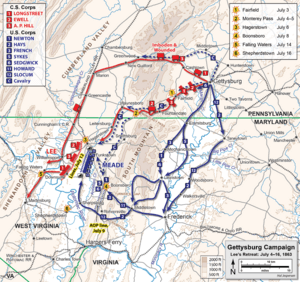Battle of Funkstown facts for kids
Quick facts for kids Second Battle of Funkstown |
|||||||
|---|---|---|---|---|---|---|---|
| Part of the American Civil War | |||||||
|
|||||||
| Belligerents | |||||||
| Commanders and leaders | |||||||
| John Buford | J.E.B. Stuart | ||||||
| Strength | |||||||
| 1 cavalry division 1 infantry brigade |
1 cavalry division 1 infantry brigade |
||||||
| Casualties and losses | |||||||
| 479 | |||||||
The Second Battle of Funkstown happened near Funkstown, Maryland. It took place on July 10, 1863, during the American Civil War. This battle was part of the Gettysburg Campaign. Union soldiers attacked the Confederate army's rear guard. The Confederates were retreating from Pennsylvania. They were heading back after the big Battle of Gettysburg.
Contents
Why the Battle Happened
After the Battle of Gettysburg, the Confederate army was heading back to Virginia. Their leader was General Robert E. Lee. They needed to cross the Potomac River near Williamsport.
A strong group of Confederate soldiers was in Funkstown. They were led by Major General J.E.B. Stuart. His cavalry (soldiers on horseback) protected Lee's army. Stuart's job was to keep the Union army busy. This gave General Lee time to build defenses. It also helped Lee's army retreat safely.
The Battle Begins
On the morning of July 10, 1863, Union cavalry approached Funkstown. They were led by Brigadier General John Buford. Buford's soldiers moved carefully along the National Road.
They soon met Stuart's Confederate battle line. It was shaped like a crescent moon and was three miles long. This was Stuart's first defensive battle since coming back into Maryland.
Key Defensive Spots
The Confederates held the high ground on their far right. This spot was defended by Preston Chew's horse artillery. Horse artillery means cannons pulled by horses.
A stone barn and its yard wall were also important. They gave a great defensive spot. The 34th Virginia Battalion used this position. These were dismounted cavalry, meaning soldiers who usually ride horses but were fighting on foot.
Fighting Through the Day
Around 8:00 a.m., Union cavalry attacked. They were led by Colonel Thomas C. Devin. His soldiers fought on foot.
By mid-afternoon, Buford's cavalry was running low on ammunition. They hadn't gained much ground. Then, Colonel Lewis A. Grant's infantry arrived. Infantry are soldiers who fight on foot. This group was called the First Vermont Brigade.
Infantry Clash
The Vermonters attacked the Confederate center. They were less than a mile away. They didn't know that General George T. Anderson's Confederate brigade was now facing them. This was the first time opposing infantry had fought since the Battle of Gettysburg.
The End of the Day
As evening came, the Union Army started to pull back. They moved south towards Beaver Creek. Other Union army groups were gathered there.
Stuart's Confederates had successfully held off the Union forces. They had kept the Union army busy for another full day. This allowed General Lee's retreat to continue.
Aftermath and Casualties
The battle lasted all day. It took place east of the main road. There were 479 casualties (soldiers killed, wounded, or missing).
The Chaney house was used as a hospital. At the Keller home, Confederate Major Henry D. McDaniel was wounded. He later became the governor of Georgia. He survived his wounds but spent the rest of the war in a Union prisoner-of-war camp.
A smaller fight also happened near Funkstown on July 7. This was three days before this main battle.
 | Misty Copeland |
 | Raven Wilkinson |
 | Debra Austin |
 | Aesha Ash |


